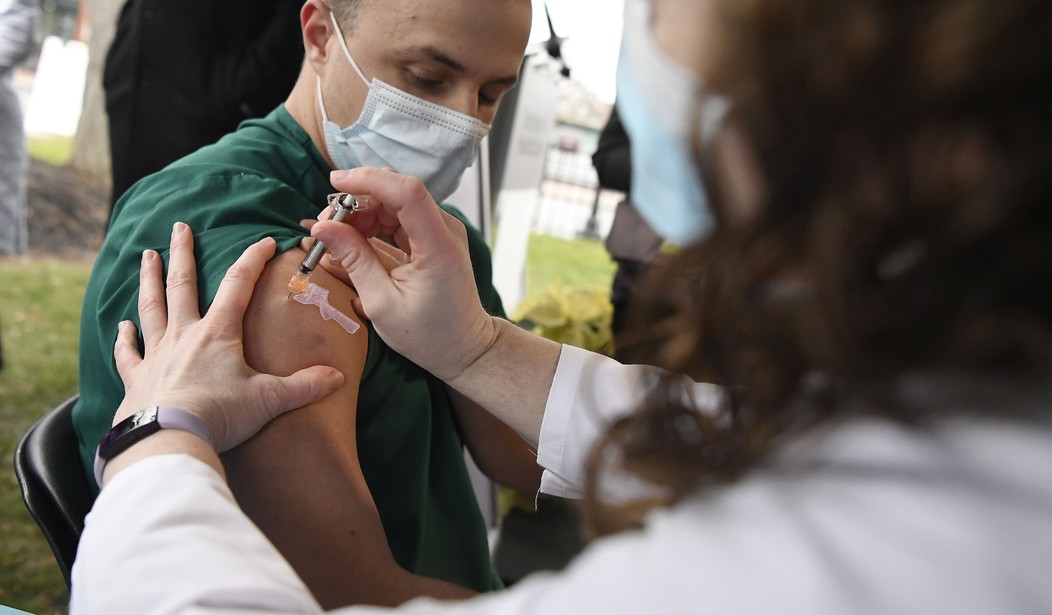“I’m a little surprised, according to the data, that it’s starting to wane already,” said vaccine expert William Schaffner to NBC about this study published yesterday. I think it’s unlikely that the feds will recommend another booster near-term, with everyone expecting a period of COVID quiescence following the Omicron surge.
But an annual booster in the fall, before the expected winter surge, now looks inevitable.
And it’s a cinch that the cautious expert class will cite the new data on waning booster immunity to argue that we shouldn’t drop COVID restrictions this spring. In fact, it’s already begun:
For those of us who favor careful, last wk has shown:
1) Waning efficacy of boost after 4 mos; 2nd boost not available
2) Some concerning signals about long-term risks of Covid
3) Case rates falling fast but still fairly highWe all want “normal” but prudent stance is “not yet”
— Bob Wachter (@Bob_Wachter) February 12, 2022
The good news from the CDC study is that three doses continues to provide more protection than two, even four months out. And that protection is solid, with 78 percent effectiveness against inpatient hospitalization. Against infection and outpatient treatment (ER or urgent care), though? Less solid.
The vaccine was 91 percent effective in preventing a vaccinated person from being hospitalized during the two months after a booster shot, the study found. But after four months, protection fell to 78 percent.
Protection faded more in preventing trips to urgent care and emergency departments, falling from 87 percent in the first two months to 66 percent after four months. After more than five months, vaccine effectiveness fell to roughly 31 percent, but researchers noted that estimate was “imprecise because few data were available” for that group of people.
The study was conducted from late August 2021 through late January 2022, a period that encompasses waves of both Delta and Omicron. The CDC found that vaccine effectiveness was lower during the Omicron-dominant period than during the Delta-dominant period, which is what we’d expect given Omicron’s greater number of mutations. The odds that the next shot will be tailored to Omicron specifically are rising, in other words, particularly since Omicron now accounts for literally 100 percent of all COVID cases in the U.S.
There’s a complication with the CDC data, though. Since elderly and immunocompromised people were the first to become eligible for boosters in the U.S., how representative of the general population is the “waning” immunity seen in the numbers above? If the cohort that got a third dose before everyone else also happens to be the cohort that’s most likely to be hospitalized if infected, even if vaccinated, maybe we shouldn’t draw hasty conclusions from these numbers about what the average healthy person’s immunity looks like four months after being boosted.
Here’s a chart from British Columbia that’s making the rounds on social media today that proves the point. Boosters work to reduce the odds of hospitalization in every age group, among the healthy and unhealthy, but the impact is outsized among those who are older and sicker:

Gotta be careful about drawing general conclusions from data like the CDC study in which the old and infirm are likely to overrepresented. And even if it’s true that the effectiveness of the third dose declines meaningfully in the average person after four months, there’s still a major long-term benefit from being boosted. The more familiar one’s immune system becomes with the virus’s spike protein, the more nimble it’s apt to be at anticipating new variants that may arise in the wild:
[The data] also show that vaccines developed against the ancestral virus strains are still providing protection against new variants, said Albert Ko, an infectious-diseases physician and epidemiologist at Yale’s School of Public Health.
“Each time we are boosting with these vaccines, our immune responses may be getting broader and not narrower in protecting against the scope of variants we are encountering,” he said. Protection against the array of variants two years into the pandemic is “pretty amazing, whether you’re getting the primary series or that boost.”
There may be another important benefit from vaccine immunity. A hair-raising new study of 11 million American veterans found that those infected with COVID a year ago had a substantially higher risk of 20 different cardiovascular illnesses — heart attacks, arrhythmias, strokes, cardiac arrests, you name it — a year later compared to vets who didn’t have COVID. Cardiologist Eric Topol called the data “stunning … worse than I expected, for sure.” Another cardiologist speculated that COVID might end up posing a greater long-term threat to heart health than smoking or obesity. A key takeaway: “The risk [of heart problems] rose with severity of initial disease.”
There’s nothing in the study about the vaccines, but if it’s true that severe COVID means a higher risk of heart complications later then it may be that getting vaccinated meaningfully reduces the chances of developing COVID-induced heart problems long-term. There’s little anyone can do to avoid being exposed to the virus but there’s one big thing they can do to lower their odds of severe illness.
I’ll leave you with this data from NYC via WaPo. New York’s Omicron wave was nasty, but much nastier for one particular group.








Join the conversation as a VIP Member